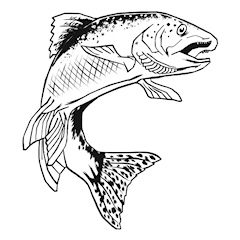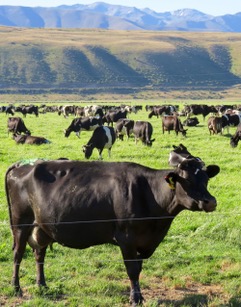Opinion by Tony Orman
For well over a century successive governments have tried to take over the administration of trout and salmon fishing.

In the 1860s the new colony had set up an “acclimatisation societies” administration which over a century later in 1990, morphed into the current Fish and Game organisation.
The motives behind some of the government takeover moves might have been monetary, i.e., Fish and Game licence money. But in the last 50 years the real motive has been to remove a potential obstacle to government policies to exploit resources such as rivers, water for irrigation or for hydro-electric dams or just to overrule opposition to freshwater pollution.
Over the decades, both acclimatisation societies and Fish and Game have often been to the fore in conservation issues, advocating for the “wise use of resources.”
Fish and Game for over a century has been involved in the biggest fights to save our environment: the “Save Manapouri” campaign, opposition to trout farming, the proposal to build an aluminium smelter at Aramoana near Dunedin, and countless hydroelectric and irrigation projects.
But then Government interference with outdoor sport administration goes back a long way. For example, in 1907, the government of the day cut Rotorua and its lakes out from the Auckland Acclimatisation Society region and put them in their own government region under control of the Tourist Department.
That deprived the Auckland Acclimatisation Society of most of its licence revenue. In doing so, the government arrogantly ignored a select committee’s recommendations against this move – an action one paper said was “gross abuse of administrative authority”.
But governments continued to enviously eye the sporting public’s fishing and shooting administration and management.
Other takeover moves ensued. Acclimatisation societies fought back.
“The New Zealand Fishing and Shooting Gazette” in its September 1, 1939 issue in an editorial telling the Minister of Internal Affairs W “Bill” Parry that his idea for a government department to take over acclimatisation societies was nonsense.
State Control
The president of the Auckland Acclimatisation Society then starkly spelt out that the choice was between acclimatisation societies or state control.
The bid by governments for state control of fish and game has been both open and covert.
In 1968, the National government showed its hand when it set up a Commission of Enquiry into the Organisation of Wildlife Management and Research. It became popularly known as the Hunn Report.
An editorial in the New Zealand Outdoors magazine (May 1971) said “the dominant theme of the Hunn Report “is a government administered management of the country’s fish, game and wildlife resources.”
The target in the sights of government was the Acclimatisation Society organisation, the fore-runner of today’s Fish and Game organisation.
The editorial commented on the Acclimatisation society model as having “some faults, some domestic and some national, but one thing is undeniable in that the Acclimatisation Society organisation does give the sportsman the right and voice in managing his/her own affairs.”
Hunn Report
The Hunn Report was shelved with a change of government in 1972 when Norman Kirk led Labour to a landslide election victory with issues such as “Save Manapouri,” opposition to trout farming, land sales to foreigners and commercial exploitation of fishing and hunting to the fore in the election campaign.
But the envious desire of government didn’t go away and the intent on seizing control of Fish and Game was only just below the surface.
The Labour government that had been strongly elected in 1972 disintegrated into a leaderless rabble after the death of Prime Minister Norman Kirk, himself a keen outdoorsman.
The new prime minster was the weak and inept Bill Rowling. With Kirk no longer there, bureaucrats in departments set Henry May, Minister of Internal Affairs, on course to make yet another state grab for control of Fish and Game administration.
Entitled a “National Executive Scheme” another state control bid was launched by government.
Some weak, compliant acclimatisation society heads were ready to surrender. At one acclimatisation society AGM meeting, I proposed a motion strongly opposing government’s takeover plans. The acclimatisation society’s solicitor angrily spoke against the motion and (said “you’ll f—- things up.”
The motion was handsomely passed.

John Henderson, national president NZDA
May’s Tirade
As a spokesman for the NZ Federation of Freshwater Anglers (NZFFA) I opposed the proposed government interference and wrote to the Minister of Internal Affairs Henry May.
His reply was a three-page rant in which he labelled me as “ignorant, emotionally obsessed and loose with the facts.”
Of course his abusive tirade had been written by a departmental bureaucrat, but there again he had signed it. As John Henderson pointed out to me, I had struck a raw nerve because otherwise he would not have devoted three pages to me, plus the verbal abuse. After all Henry May as minister could have just thanked me in a single sentence for my views.
Soon afterwards, NZFFA secretary the late Ted Bason and myself took the opportunity to see Prime Minister Rowling who was in Picton and available for interviews.
On entering the room at Oxley’s Hotel and introducing ourselves, the Prime Minister emotionally exploded and shouted in an extraordinarily hot tempered outburst, “ I know who you are, you took a swing at my minister!” He continued to shout abuse until he realised Ted and I were bemusedly smiling.
It’s worth recounting this to emphasise the arrogance and depth of takeover intention and the verbal abuse that will usually be government’s response.
Don’t be afraid. Politicians are merely public servants. But sadly for democracy and so often, they forget it.
Sole Agenda
Now I doubt if both Minister Henry May or (PM Bill Rowling) had ever gone trout fishing. Their sole agenda was state control of fish and game administration.
Although Rowling’s Labour government at the 1975 election was defeated by National led by Rob Muldoon, the threat of a government takeover loomed and then surfaced.
So in 1976 the late John Henderson, myself and Alan Simmons went as a deputation on behalf of the Federation of Freshwater Anglers to see Minister of Internal Affairs Alan Highet, who assured us that no threatening gestures such as the Hunn Report would be implemented.

Alan Simmons
A New Zealand Outdoor magazine editorial (June 1976) slammed successive government’s attempts to control on fish and game administration. It urged acclimatisation society regional councils and the national council to “not be cowered by dictatorial ministerial demands.”
Where are those brave voices in 2025?
Fight of the Century?.
John B. Henderson, an ardent conservationist and former councillor on the Wellington Acclimatisation Society, had in presidential addresses to annual conferences of the New Zealand Deerstalkers Association, strongly criticised governments trying to control acclimatisation societies.
“Can you imagine the Prime Minister having the gall to seize control of rugby or racing – he would buy the fight of the century – which makes his manoeuvres with the fish and game sports all the more inexcusable.”
He spoke of several attempts going back to the 1930s of government attempts to takeover fish and game administration.
Among many letters to the “New Zealand Outdoor”, in the June 1976 issue, Alan Simmons wrote supporting “political independence for outdoor sportsmen” and rejecting government interference.
New Zealand’s acclimatisation societies were primarily founded in the 1860s which makes the democratic model over 160 years old.
Now in 2025, it seems the proposals designed to disinherit the outdoor sporting public of its multi-decades right to administer the public sports of trout and salmon fishing – and duck and game bird shooting – are in government’s sights again.
User Pays-User Says
One thing should be abundantly clear – the policies and management required to sustain the large, egalitarian sports of fishing and hunting are the prerogative of the user, not back-room, bureaucratic boffins who have never held a trout or salmon rod in their lives and never will.
Fish and Game, which evolved under the Conservation Law Reform Act 1990 from Acclimatisation Societies, will have its wings severely clipped under the National-NZ First-Act coalition government’s proposals.
Reportedly, if the proposals are cemented in, court action – such as opposing a despoiling of a river for instance – can be taken by Fish and Game at regional level only if the minister or the Fish and Game national office agree to do it. A DoC fact sheet states it is the national council that will set binding policy on advocacy for regional Fish and Game bodies.
A major blunder was made in 1990 when acclimatisation heads failed to notice that the new Act made the new Fish and Game councils obligated to the Minister Conservation, i.e., in reality the Department of Conservation.
There is more than a slight relationship to today’s Coalition government’s attitude to the environment as evidenced in its Fast Track Approval Act 2024. Minister Shane Jones may sneer at “Freddie the Frog” in wanting to mine the Coromandel. Almost certainly he will sneer at Trutta the Trout and Salar the Salmon, in wanting full-flow irrigation for corporate dairying sucking major rivers to a shrunken trickle.
Alarmingly for democracy and the public’s views, the normal select committee process has been dumped.
Less Say
The outdoor sporting public will have much less say in administering management of trout and salmon and protecting the environment of free flowing clean rivers.
One proposal in discussion is for the new Hunting and Fishing minister will have the right to further dilute democracy by appointing at least two councillors – probably DoC bureaucrats – to each regional Fish and Game council, and it least one iwi member. And license holders (i.e. Fish and Game) will have the burden of paying the costs of these members riding roughshod over community values.
Full further details may yet emerge.
Analysing it all is the strong odour of the Fast-track legislation and harking back, the stench of the repugnant action in 2010 by National’s Prime Minister John Key – and ironically the Minister for the Environment Nick Smith – in adopting a communist-styled takeover of Environment Canterbury Council. The motive was purely to launch the expansion of corporate dairying into drylands low-rainfall regions with subsequent heavy irrigation. They installed their own sycophantic puppet commissioners to speed up the exploitation.
The hostile takeover of ECan and now the proposed covert takeover of Fish and Game have much in common. There’s also more than a mild suspicion that moneyed corporate exploitive interests have been lobbying hard to get rid of Fish and Game.
In 2021 the Labour government commissioned a review into Fish and Game, released 27 April, 2021. Yet the then minister said Fish and Game’s role was to “[protect] the freshwater and other values so precious to all New Zealanders.”
But those “precious values” now seem ignored by the coalition government.
Already there are reports of weak-kneed, subservient reactions by some Fish and Game councils of not wanting to upset the Minister of Hunting and Fishing.
They don’t seem aware that the minister is a public servant – not a master of the public and the public property of rivers.
Footnote. Tony Orman has spent a lifetime fishing and hunting and is the author of some two dozen books, mostly on the outdoors. Former president of NZ Recreational Fishing Council and spent 30 plus years on acclimatisation society/fish and game councils.


No gov take over but button off the farmers and work a compromise
Thank you Tony Orman for your brief precis of your personal and at times fraught interactions on behalf of the acclimatization societies with various government ministers. A more complete overview is contained in the late RM McDowall’s Game Keepers for the Nation: The story of New Zealand’s acclimatization societies, 1861-1990
pub. 1994. You are correct that governments have long viewed the societies’ independence as an obstacle to their plans for development/exploitation of New Zealand’s freshwater resource. The Rakaia River National Water Conservation 1988; the second NWCO in the country was successfully sought by the acclimatization societies to protect the then largely unmodified iconic braided river from being exploited for hydroelectric development and irrigation. This worked until John Key targeted Canterbury’s NWCO by passing the ECan Act 2010 under urgency and replaced elected ECan Councillors with his own appointees. Key was successful in achieving his goal in the short term but has left an as yet un-managed legacy of water pollution to be addressed by future generations. His actions caused a greater long cost in terms of public and environmental health, than the estimated $300 million boost in GDP from the environmentally unsustainable dairy farms that now cover the Canterbury Plains.
F&G have had an undistinguished record as environmental advocates since they were established in 1990. James Meager’s “reforms” look to remove the last vestiges of “independence” setting Canterbury up for another catastrophic round of irrigation development. It will bring F&G’s relevance into question when Cantabrians no longer chose to buy licenses to fish ever degraded regional freshwater fisheries.
Any survey asking people how much they trust Government will tell you that trust in politics is at all time lows. People who have had a close look write material like the following. “There is a cosy inbred club running New Zealand. It comprises interconnected individuals across politics, the corporate sector, and the civil service, who are often promoted way beyond their abilities. Every high-status job in the country is just a job for mates, and appointments are so corrupt it’s beyond belief, it’s just a group of people going from one big job to the next even when they’re not qualified and don’t deserve the job. The last Labour government entrenched a culture of ideological appointments, and the National-led government is continuing the same pattern – just swapping in their own preferred cronies or not appointing anyone all.
Government control of Fish & Game? No way.
We don’t want or need the government to be involved with Fish & Game. Everytime government gets involved it just make things worse.
Inept Councillors (both regional and National) appear to be a recurring theme in F&G management. This creates a weak point for the government to weasel its way into the management of our precious fishing and hunting resources. Just look at how DoC “manages” big game hunting. Similar mismanagement will no doubt occur if DoC gets anywhere near F&G Councils. If iwi want to get involved in F&G management they can run for Council like anybody else.
How does the government think it can run a fresh water fishery when half the time they can’t run a country.
There have been times when I have looked upon F & G as wasters and not serving us who pay fees at all . Eg. when Bryce ,our CEO boasted at spending $8million on litigation, mostly antagonising farmers. Spending half that on helping farmers overcome their
many environmental problems would have better served the problem with dirty rivers .
Spending $400,000 fighting a cycle way beside the Oreti river was a disgrace too.
They forced the cycling fraternity to spend a similar amount and then lose.
This was absolutely selfish. both are compatible . I have fished and cycled that river.
I have little time for F&G . but do not think they should be “Taken Over “
What bugs me is that Fish and Game, are run at no cost to the taxpayer because F&G is totally funded by fishing and shooting licence fees, yet are beholden by law to the Department of Conservation, funded by the taxpayer.
DOC is surely one of the most incompetent departments.
DOC has been infiltrated by the Forest and Bird wokeists, who see introduced fish and game as evil. Has it occurred to them that all humans in NZ originate from self introduction by way of migration?
What an informative article on governments trying to seize control of the public’s fish and game administration and management. Thank you.
While Fish & Game needs to work hard to keep its strategies, structures, key performances, and other elements nationally unified, up-to-date, relevant, and effective .. there is no need for the government to take the driving seat on national affairs of fish and game management. In fact, history tells us heaven forbid .. they’d be more likely to stuff it up. Politicians and bureaucrats should keep their noses out .. and stick to the things they otherwise (don’t always) do well!